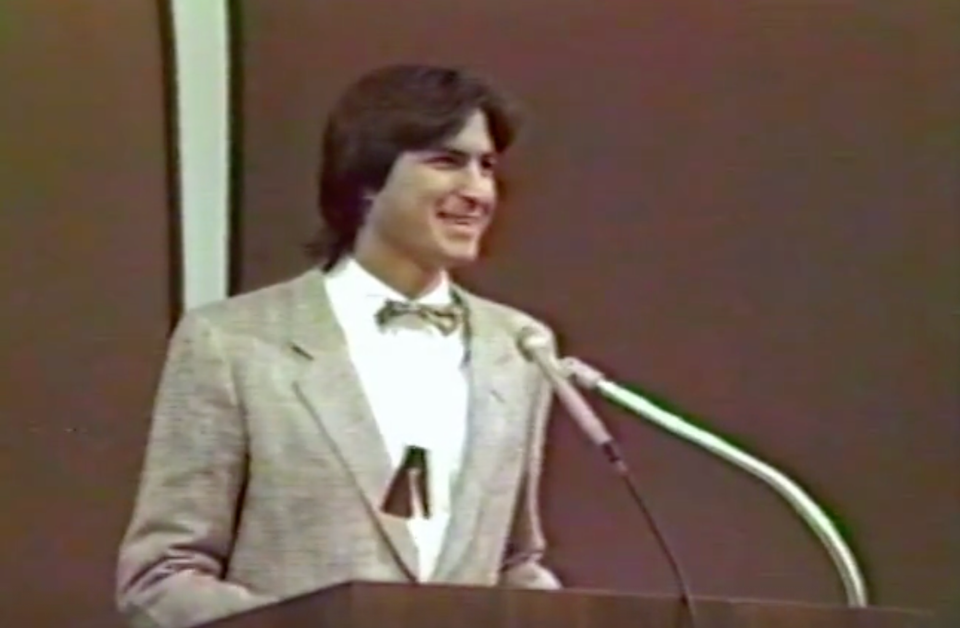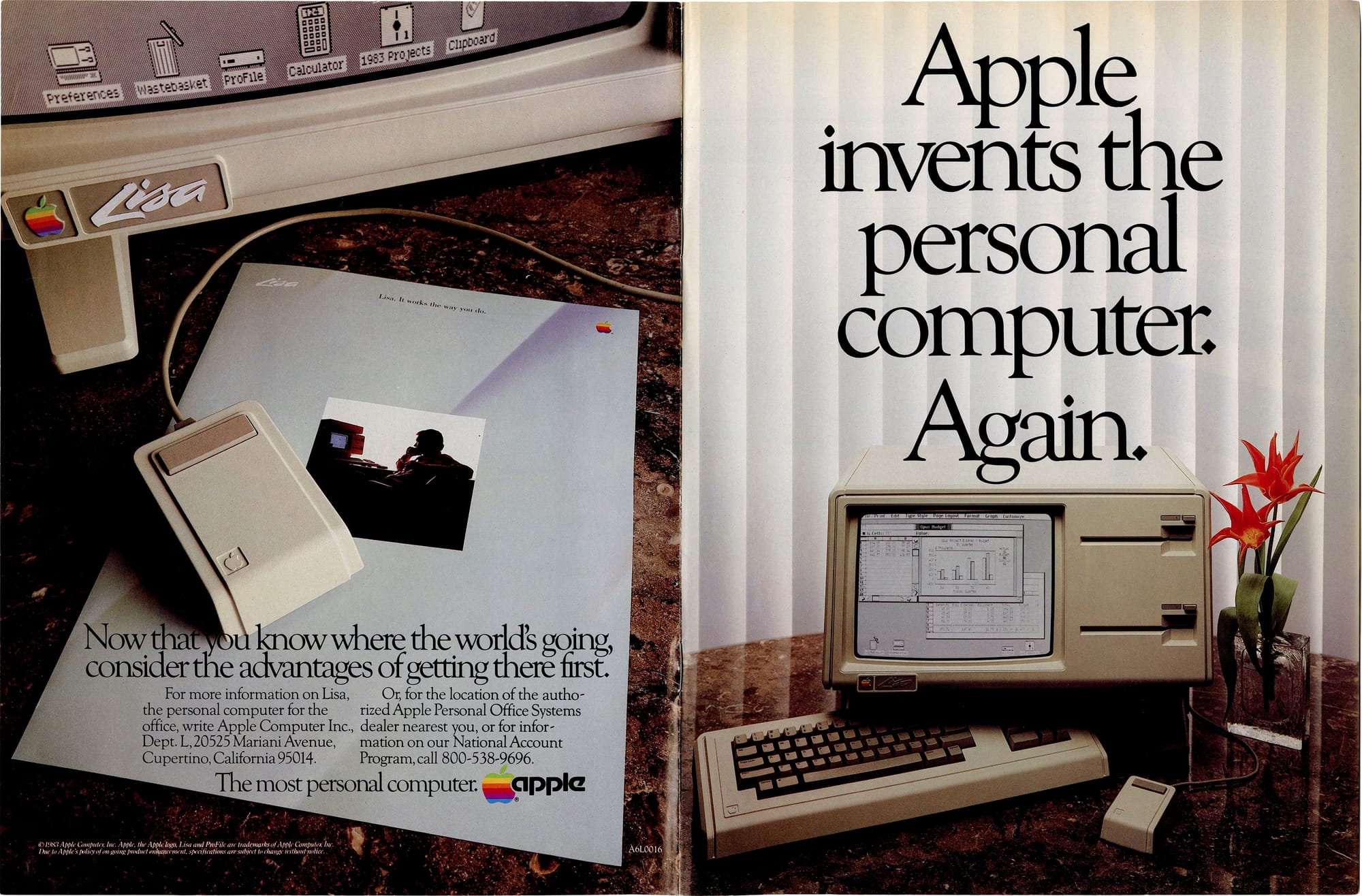When Steve Jobs Called the Design World to Arms

I've never seen a bad Steve Jobs video. So when a new one is put out there into the world, the bar is quite high. Surprising no one, "The Objects of Our Life" talk from the 1983 International Design Conference in Aspen that the Steve Jobs Archive released last week does not disappoint.
It starts with about 20 minutes of prepared remarks by Jobs. Those are interesting and insightful enough, but you also see a 28 year old entrepreneur get a bit lost in his own notes at times. He always brings it back by making some off-the-cuff comment or quip. And his remarks sort of crescendo up to a moment at the end when he talks about future computer software that might make it possible for him to ask someone like Aristotle a question, rather than just reading his work. Yes, this is Steve Jobs essentially talking about our current obsession with AI over 40 years ago. "We might not get the right answer, but maybe we will."
Multiple times in his talk, Jobs lays out a vision for the world in which we now very much live.1 Beyond the basic hardware and software elements, which were obviously still very fledgling at the time, he nails the high level notions of what computing would become. It would be easy to be far off in at least some of the thoughts, but only the timelines are amiss, and some of those not even by that much. And obviously that level of prognostication comes about because he in no small part willed a lot of what he talks about into existence. Said another way: it's somewhat easy to predict the future when you're the one who intends to build it.
Understatement of the century, perhaps. And yet...
His talk really takes off though when he ends his prepared remarks almost comically abruptly with "so what do you want to talk about?" The crowd sort of laughs and then realizes he's dead serious and breaks into applause. And then the questions start. I've written about Jobs' ability to command a Q&A before, and it was clearly the mode in which he best operates. As someone who was in a few such sessions (mostly public, as a member of the press, but one memorable one which was private), it's impossible to overstate how good he was at these. Everyone knows the famous/infamous "reality distortion field", but it really undersells Jobs' ability to command a room by speaking in a way that's intensely human.
Too many of our current crop of entrepreneurs and CEOs just cannot do this for whatever reason. So many over the years have tried to emulate such abilities for obvious reasons, but they make mimic the look and feel of such a talk, but can't copy the underlying empathy that seems to exist within Jobs in these settings. You can say it's an act, but it works. Over every talk. Over years and years. Time and time again. It's both a command of what he's talking about and an ability to convey true belief in what he's talking about. Mixed with a way to make it all relatable to seemingly every person in the room.
And that last bit is what's so great about this just-released talk. As he surveys early on in his chat, most of the audience, which are designers, have little to no idea about personal computers. Again, it's 1983. Jobs figures out a way to explain something decidedly alien in terms everyone can understand, mostly by equating it to automobiles and other such technology of yesteryear. And he mainly does it by selling them on the notion that he needs their help in making this future that he's outlining a reality.
In the middle of this studied presentation, he interrupts himself. "Let me digress for a minute," he says. Then he goes off script.
"One of the reasons I'm here is because I need your help."
For this, the heart of his message to the designers in Aspen, he doesn't need his notes.
He predicts that the industry will sell three million computers in 1983 and ten million in 1986, "whether they look like a piece of shit or they look great." The audience, pleasantly scandalized, laughs at his swearing, but Steve doesn't crack a smile. He doesn't say so, but he has already seen proof of what he considers indiscriminate taste: sales of the IBM PC, the computer Steve is likely thinking of when he says that current machines "look like garbage" and are a "pain in the ass," have just overtaken sales of Apple's flagship Apple II.
The words on the page are fun, but you really have to watch the talk to hear and see how he delivers these lines. Just pitch perfect.
As is his pitch for how Apple is able to attract and retain talent in such a nascent, high-risk field:
Perhaps the most revealing moment in the Q&A comes when Steve is asked about Apple's low rate of employee turnover. He starts to answer by talking about the wide distribution of stock options, then swerves to describe what he thinks really underpins people's commitment to their work. "We feel that for some crazy reason we're in the right place at the right time to put something back," he says, pausing to collect his thoughts. "Most of us didn't make the clothes we're wearing, and we didn't cook or grow the food that we eat, and we're speaking a language that was developed by other people; we use mathematics that was developed by other people." He is emphasizing every word. "We are constantly taking--and the ability to put something back into that pool of human experiences is extremely neat." This desire to "put something back" would drive his work throughout his life.
A lot of the ideas in this talk and Q&A are things that Jobs would come back to time and time again over the years, from the concept of "injecting some liberal arts into these computers" on down.
"Where we've got to get to," he says, is a place where no college student would think of writing a paper without a computer, where "people three, four years from now are using these things and they go, 'Wasn't this the way it always was?'" This sense of inevitability—so hard won, so hard to describe, and so obvious when achieved—is, for Steve, a hallmark of success. His sedimentary model of innovation works only if each generation takes the existing tools for granted.
The shorter clips beyond the main video are well worth the watch too – the answer he gives about artificial intelligence the night before seems like it is from 2023, not 1983. Also his honest answer about not knowing what people are going to use personal computers for in the home. He just is certain they'll be there, used for something. But it will be up to others – developers and users – to help figure it out.2 That gives one a lot of hope for something like the Vision Pro.3
Lastly, here's the end of Jony Ive's introduction about the talk/footage:
The revolution Steve described over 40 years ago did of course happen, partly because of his profound commitment to a kind of civic responsibility. He cared, way beyond any sort of functional imperative. His was a victory for beauty, for purity and, as he would say, for giving a damn. He truly believed that by making something useful, empowering and beautiful, we express our love for humanity.
One more thing: watch/listen for his reference to "Darth Vader" Apple IIs!
"It comes down to trying to expose yourself to the best things that humans have done, and then try to bring those things into what you are doing."




1 Including describing a *very* early stab at what was essentially Google Street View right there in Aspen, which Jobs jokes he has no idea why it will be useful, but that it's an incredible use of technology.
2 Some fun bits in here too about how he envisions developer cuts and marketplace take rates! Apple may want to use these in future regulatory battles!
2 At the same time, the world is a very different – obviously – and mature place when it comes to computing. And I still worry Apple shipped something like the Vision Pro because of the "that's what Steve would do" mentality.

